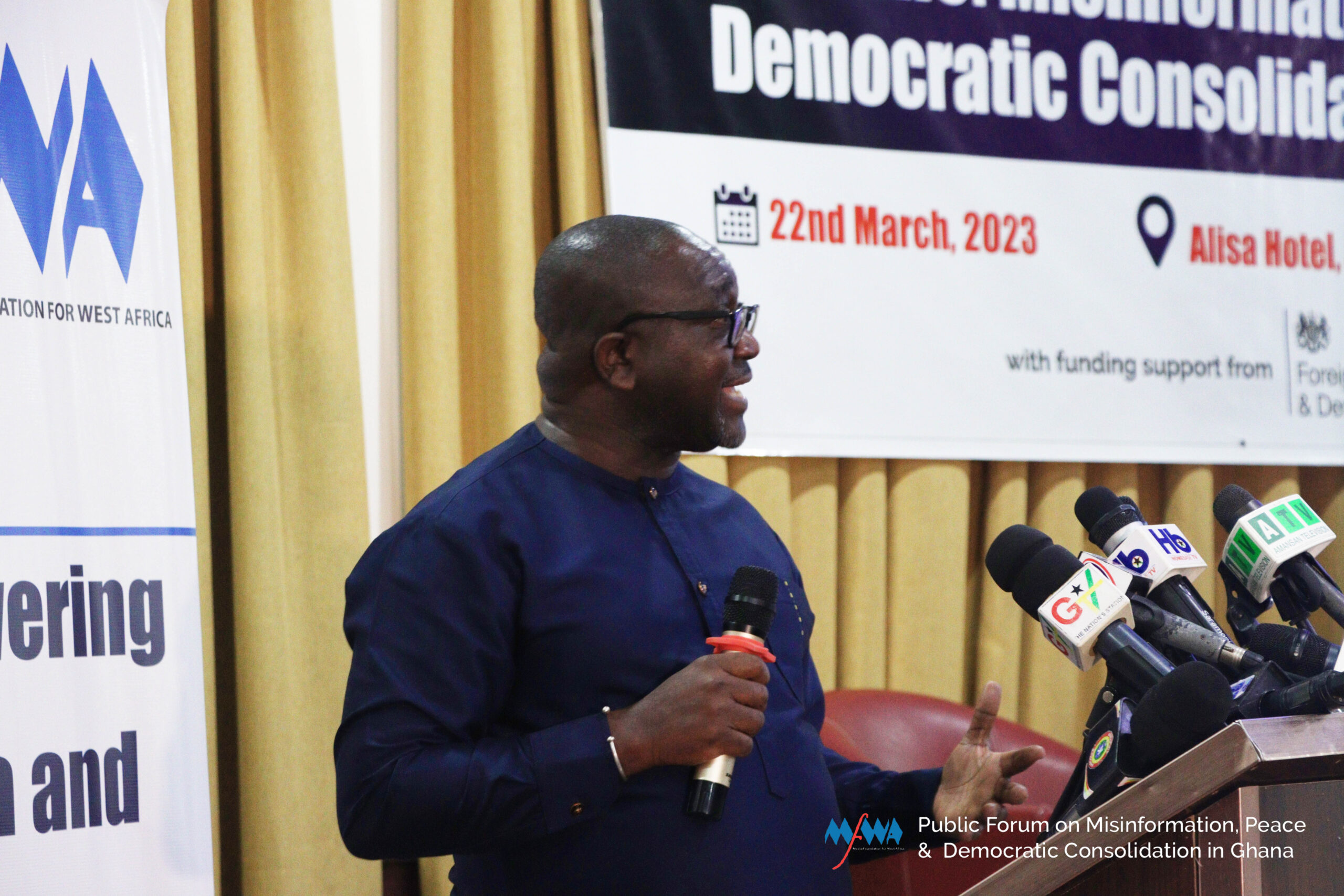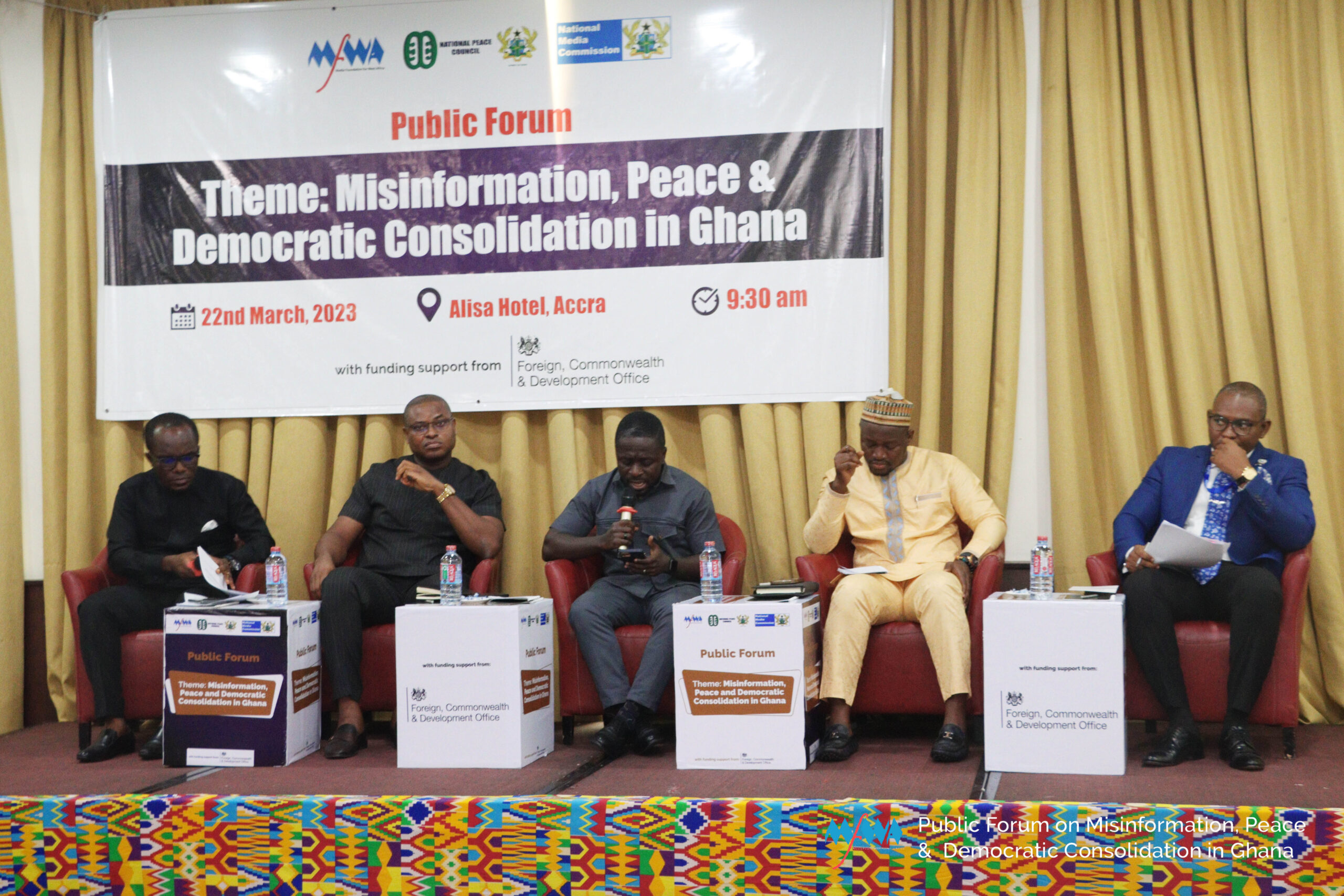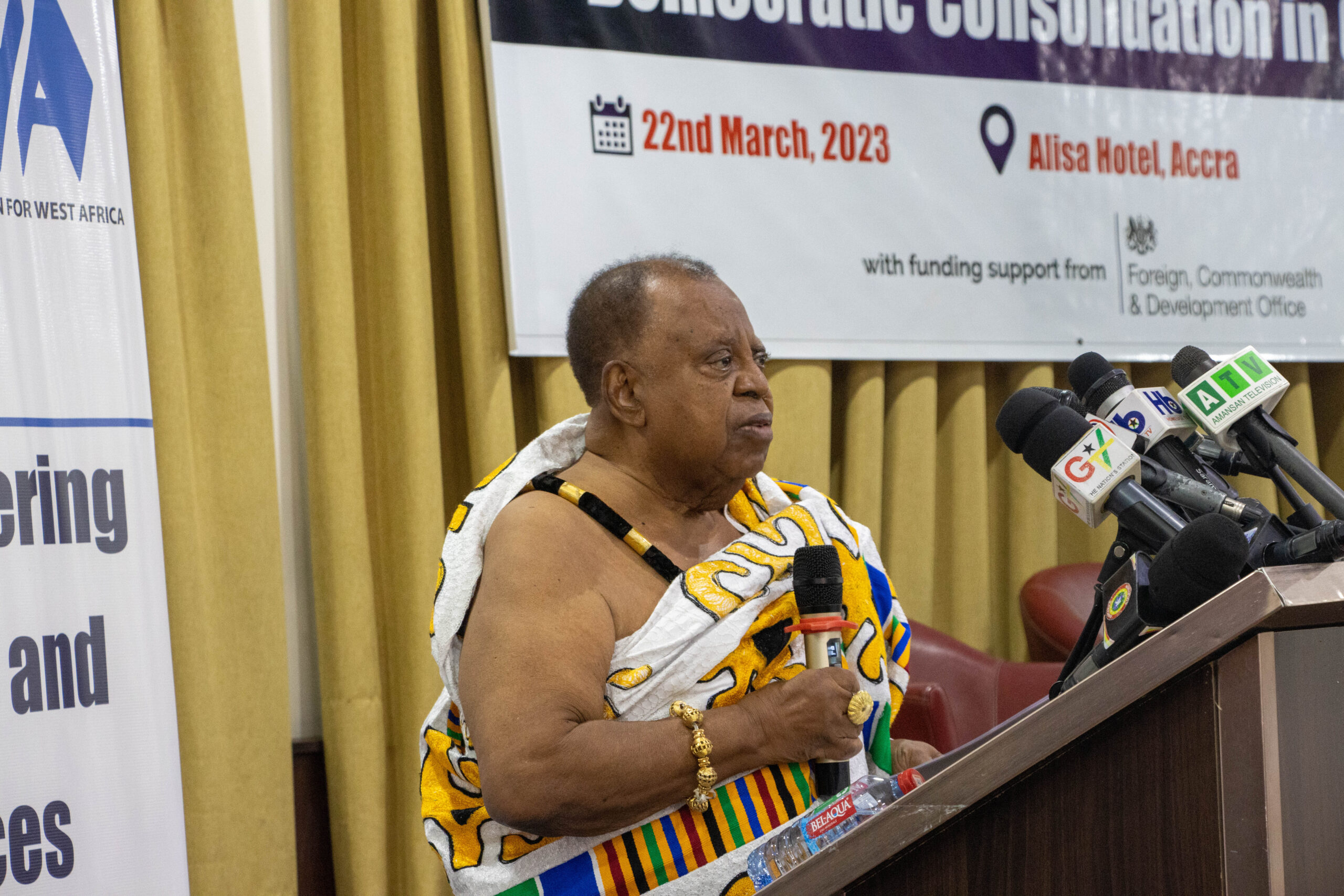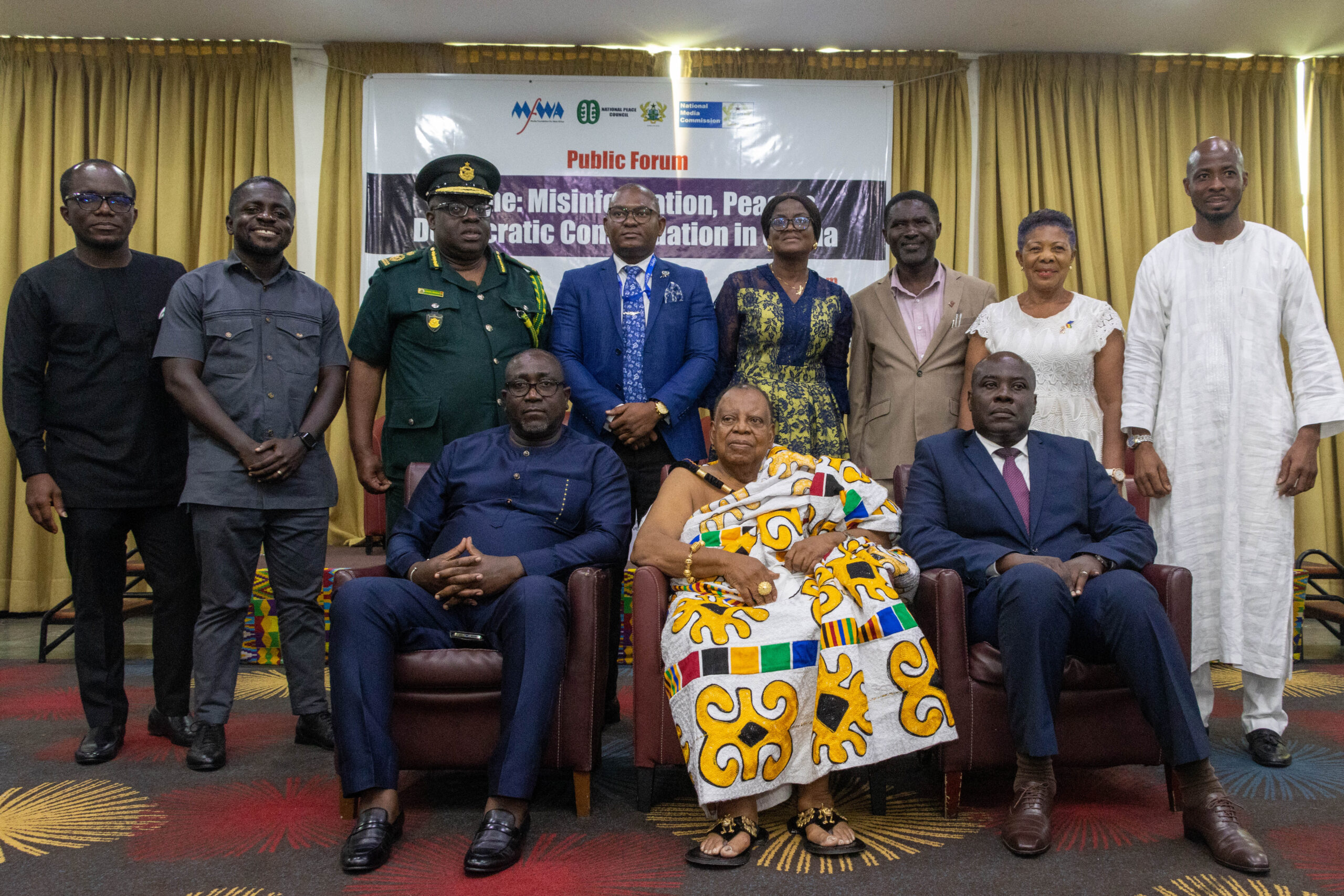Participants in a public forum on mis-disinformation in Ghana, have highlighted political party propaganda, legacy media’s sacrifice of news accuracy for speed and the Ghana government’s regulation challenge, as the main drivers of the problem.
Consequently, stakeholders, especially government, have been urged to tackle these three main factors in order to address the problem. Participants also demanded more responsibility for information accuracy from big tech companies and App makers.
Held in Ghana’s capital, Accra, the forum which came off on March 22, 2023, was themed: Misinformation, Peace and Democratic Consolidation in Ghana. It was hosted in partnership with Ghana’s National Peace Council (NPC) and the country’s media regulator, the National Media Commission (NMC).
Outlook on legislation
Nana Prof. S.K.B Asante, Omanhene of Asante Asokore and Board Member of the National Peace Council, chaired the forum. It brought together stakeholders from government, political parties, the diplomatic community, academia and civil society.
It had as keynote speaker, Mr. George Sarpong, Executive Secretary of the NMC who said a popular thinking that the internet is too broad to be regulated is a myth and that as has happened in countries like China and Rwanda, it can be regulated in Ghana too.

Mr. Sarpong sought to allay fears that regulation will curtail free expression, saying it will be done democratically. He, however, urged civil society to be ready with inputs for an upcoming national discourse on regulation, warning that otherwise civil society will be taken by surprise.
Panel discussion
As part of the forum, a panel with representatives from the two main political parties in Ghana – National Democratic Congress (NDC) and New Patriotic Party (NPP) – was convened.
Mr. Alhassan Suhiyini, Member of Parliament for Tamale North who represented the NDC said one of the biggest drivers of misinformation is the failings of legacy media in its duty to provide the yardstick for factual news reporting.

According to him, it is no longer the case in Ghana that when news hits social media platforms it is crosschecked with traditional media because, in a bid to keep in competition in the heavily digitalized news world, traditional media is sacrificing accuracy for speed. This departure from proper news values has also seen traditional media increasingly become reliant on social media for news, a situation which he said often leads to traditional media affirming fake news.
Mr. Suhiyini agreed with another panelist, the MFWA’s Fact Check Lead, Kwaku Krobea Asante, that from fact-checking trends, politicians in Ghana tend to be the worst perpetrators of mis/disinformation, especially in election years. According to the MP, it is so because politicians are constrained to package their campaign messages in such a way that they really hit home with voters.
Meanwhile, the MP for Tamale North also called on the authorities to demand more responsibility from big tech companies like Meta which owns Facebook and WhatsApp, as far as ensuring the accuracy of information that circulates on their platforms is concerned.
He lamented that these big tech companies are lax with these responsibilities in Ghana even though in other places like Europe and the US, they have taken more responsibility.
Mr. Richard Ahiagba, the NPP’s Director of Communications who represented his party, also agreed that politicians are notorious perpetrators of mis/disinformation in Ghana but said the problem should not be blamed on politicians alone. He also called for collaborative efforts by all stakeholders to tackle the problem.
Another panelist, Dr. Victor Doke, Lecturer at the Kofi Annan International Peacekeeping Training Centre said that Ghana was being complacent in regards to the dangerousness of mis-disinformation, adding that happenings in Nigeria’s election in 2023 should warn the country that if the problem is left unchecked, it can lead to conflict.

Well attended forum
Chairman of the forum, Nana Prof. SKB Asante, reiterated the need to tame mis-disinformation because they pollute free expression which is guaranteed by Ghana’s 1992 constitution.
He also called attention to what he described as digital provocation – the usage of internet platforms, especially social media, to provoke individuals, companies and even countries, saying it is a dangerous thing that must also be stemmed.
The forum was also attended by Ghana’s Deputy National Security Coordinator, Timothy Coleman, and representatives from the British High Commission, UNESCO Ghana and National Commission on Civic Education, who delivered solidarity messages.
Other attendees were students from the National Film and Television Institute (NAFTI) and the Ghana Institute of Journalism; and also from the Ghana Journalists Association, the Private Newspaper Owners Association of Ghana and both private and state media.
The forum forms part of a larger project being funded by the Foreign, Commonwealth and Development Office of the United Kingdom, under which 130 journalists from across Ghana are being trained in fact-checking in order to enable them counter mis-disinformation.
Recommendations in brief
Though the forum observed that the problem of mis/disinformation is for the general public confront, the government, politicians, the media and tech giants were particularized as having leading roles to play.
Government
- convene a national conversation on possible legislation on mis/disinformation
- lead the charge in demanding more responsibility for information accuracy from tech giants
- sponsor public education campaigns on the subject matter
Politicians
- must make conscious efforts to deodorize their campaign messages of inaccuracies
- educate representatives to argue and campaign with researched facts
- desists from planting and/or forwarding rumours in the media
Media
- return to proper news values, including accuracy, fairness and balance
- wean themselves of the temptation to sacrifice accuracy for speed
- train and equip journalists and or staff with skills for detecting and dissuading mis/disinformation
- where factual inaccuracies are published or broadcasted, media houses should have mechanisms to rectify and update the public timeously
Tech giants
- Take more responsibility for ensuring that information that is circulated on their platforms are accurate
- should invest in mechanisms that detect and highlight inaccurate information on their platforms
- App builders should continue to research in order to come out with apps that efficiently figure out inaccurate information






